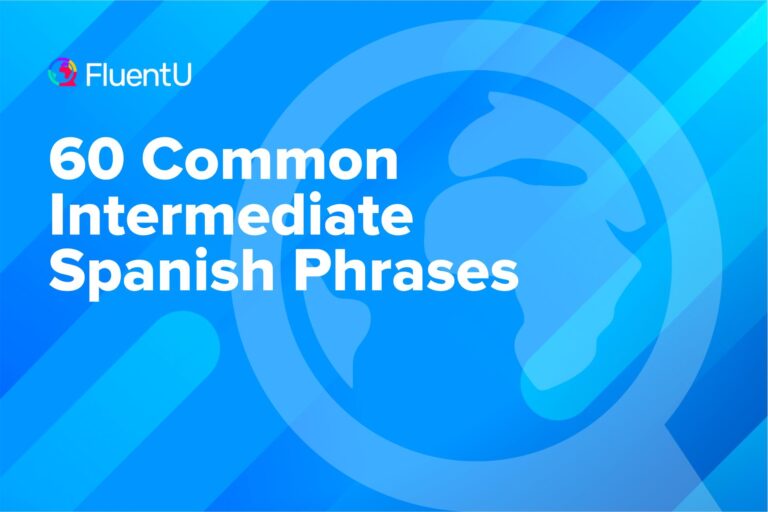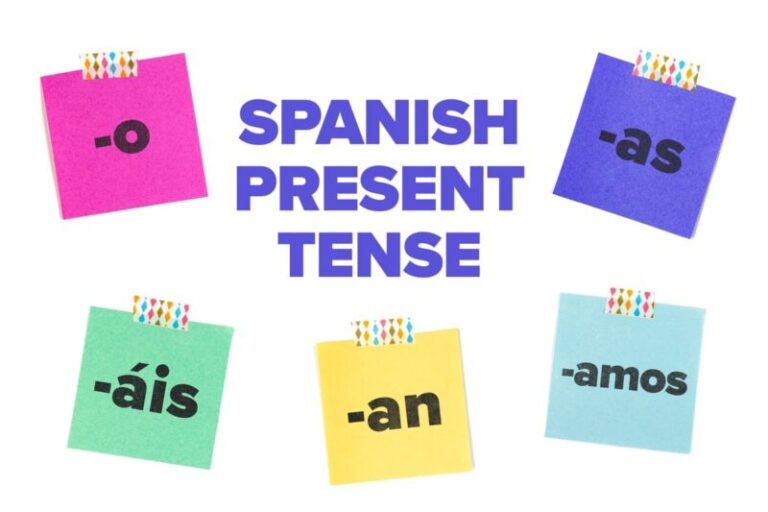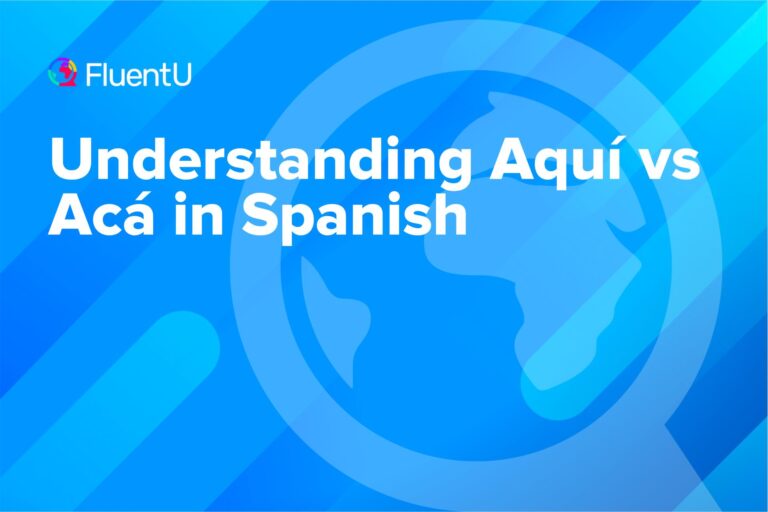Spanish Verbs with Prepositions

With phrasal words like “depend on,” “believe in” and “feel like,” prepositions are absolutely necessary to discuss a range of topics in English.
They’re also super useful in Spanish.
And there are many Spanish verbs that take prepositions, so we’ve compiled the most common into a handy list for you.
But before we get to the verbs themselves, let’s just make sure you’ve got the basics down.
Download: This blog post is available as a convenient and portable PDF that you can take anywhere. Click here to get a copy. (Download)
What is a Preposition?
Prepositions are words that provide context to sentences to relay necessary information between speakers. In short, prepositions are connectors that describe three elements:
- Where events take place: en la fiesta — at the party
- When events take place: tras la fiesta — after the party
- General descriptions: celebramos la fiesta con amigos — we had the party with friends
The English language contains approximately 70 common prepositions, whereas Spanish has 60. In most instances, prepositions are used exactly the same and are easily transferrable between English and Spanish, as you can see in examples 2 and 3 above.
However, there are several common Spanish verbs that take prepositions, when their English translations do not. Sometimes the English translation still involves a preposition, but a different one from the Spanish! And other times, the English verbal phrase has a preposition, but the Spanish translation does not—so be careful!
You’ll get a better feel for this the more you practice. For example, you can find examples of Spanish verbs with (and without) prepositions on the FluentU program.
FluentU takes authentic videos—like music videos, movie trailers, news and inspiring talks—and turns them into personalized language learning lessons.
You can try FluentU for free for 2 weeks. Check out the website or download the iOS app or Android app.
P.S. If you decide to sign up now, you can take advantage of our current sale!

Common Spanish Verbs with Prepositions
There are many prepositions in Spanish, but these top five connectors are the ones we’ll work with today. Review this shortlist and make sure you’ve got these down, as they’re used extensively in everyday Spanish conversations.
| Spanish | English |
|---|---|
| en | in |
| con | with |
| a | to/at |
| por | for/by/through |
| de | of/from |
For each of these prepositions, we’ll explore five common verbs that take that particular preposition. If you’re interested in learning more verbs than those below, you can find verb lists for each category here.
Verbs with en
The prepositional verbs in the en group can be followed by objects and/or infinitives. For our intents and purposes, keep in mind that an infinitive is simply a verb that has not been conjugated (i.e. comer , cantar ).
| Verb + preposition | Structure | Usage | Examples |
|---|---|---|---|
| pensar en (to think about/consider) | pensar en + [infinitive/noun] | This verb phrase is used to indicate that someone is actively reflecting on or contemplating something. | ¿Has pensado en comprarte un coche nuevo?
(Have you thought about buying a new car?) Estoy pensando en mi próximo viaje. (I'm thinking about my next trip.) |
| confiar en (to trust in/rely on) | confiar en + [infinitive/noun] | When followed by an infinitive, confiar en means "to be confident in" and with a noun it means "to trust in/to rely on." | Confío en hacer un buen trabajo.
(I'm confident I'll do a good job.) Confiamos en el sistema educativo. (We trust in the education system.) |
| dudar en (to hesitate to) | dudar en + [infinitive] | Dudar means "to doubt," but the phrase dudar en usually translates better as "to hesitate to" do something. | Dudo en decirte lo que pienso.
(I hesitate to tell you what I think.) |
| consistir en (to consist of/involve) | consistir en + [infinitive/noun] | When used with a noun, consistir en means "to consist of," while with an infinitive it can mean "to involve." | El trabajo consiste en viajar a menudo.
(The job involves traveling often.) La receta consiste en tres ingredientes. (The recipe consists of three ingredients.) |
| insistir en (to insist on) | insistir en + [infinitive/noun] | With a noun insistir en can also mean "to put emphasis on" something. | Insistimos en ir a la fiesta.
(We insist on going to the party.) Debo insistir en mis creencias. (I must insist on my beliefs.) |
You’ll note that prepositional verbs followed by infinitives are the equivalent of our “-ing” verbs in English. So be careful not to make the mistake of saying insitimos en yendo a la fiesta. Rather, you’d use the infinitive ir following the preposition, as in the previous example.
Verbs with con
Many of the verb/preposition phrases that use con don’t translate literally to “with” in English, so try to memorize these and be careful when translating.
| Verb + preposition | Structure | Usage | Examples |
|---|---|---|---|
| contar con (to count/rely on, to plan/hope to) | contar con + [infinitive/noun] | Saying "contar en" is a common mistake. Instead, we use the preposition con. | La empresa cuenta con contratar a más empleados este año.
(The company plans to hire more employees this year.) Cuento con ello. (I count on it.) |
| soñar con (to dream of/about) | soñar con + [infinitive/noun] | Soñar con can also be translated as "to hope to" with an infinitive. | Sueño con cambiar el mundo.
(I dream of/hope to change the world.) Mi hija soñó con hadas. (My daughter dreamt about fairies.) |
| casarse con (to marry someone) | casarse con + [noun] | Be careful with this one! It's a common mistake to use the preposition a instead of con. | Se casó con su novio de la secundaria. (She married her highschool sweetheart.) |
| comenzar con (to begin by/with) | comenzar con + [noun] | With an object, comenzar con means initiating an action, or to begin by/with. | Comienzo con una pregunta. (I begin with a question.) |
| amenazar con (to threaten with) | amenazar con + [infinitive/noun] | With both infinitives and objects, amenazar con keeps the same definition: to threaten someone with something. | Ella amenazó con demandarlos.
(She threatened to sue them.) El ladrón los amenazó con un cuchillo. (The burglar threatened them with a knife.) |
Verbs with a
The prepositional verbs in the a group are special because in Spanish, unlike English, we have a grammar rule called the personal a. The personal a is placed before the object when the object is a person.
This can be confusing because this rule doesn’t exist in English, so take a close look at the following examples:
| Verb + preposition | Structure | Usage | Examples |
|---|---|---|---|
| acercarse a (to approach) | acercarse a + [noun] | We use the preposition a even when what one is approaching is not a person. | Se acercó a mí.
(He approached me.) Me acerqué a la puerta. (I approached the door.) |
| ayudar a (to help) | ayudar a + [noun] | Like most of these verbs, the a isn't used when the object is replaced with an object pronoun. For example, you can say "La ayudaron" (They helped her), but if you use a name instead of the object pronoun (la), then you need the personal a: "Ayudaron a Sara" (They helped Sara). | Nuestra organización ayuda a las personas sin hogar. (Our organization helps homeless people.) |
| resistirse a (to resist/refuse) | resistirse a + [infinitive/noun] | Resistirse a with an infinitive usually translates to "to resist," but it can also mean "to refuse." | No puedo resistirme al pastel de chocolate.
(I can't resist chocolate cake.) Me resisto a creer en sus mentiras. (I refuse to believe his lies.) |
| llamar a (to call) | llamar a + [noun] | Again, the a isn't just for people. | María llamó a John anoche.
(María called John last night.) Llamé al banco. (I called the bank.) |
| cuidar a (to take care of) | cuidar a + [noun] | When talking about taking care of an object, we don't use the personal a. For example: Cuido bien mis pertenencias. (I take good care of my belongings.) | Cuido a mis primos. (I take care of my cousins.) |
Verbs with por
Pay special attention to verb/preposition pairings with por, as this little word is very often confused with para.
| Verb + preposition | Structure | Usage | Examples |
|---|---|---|---|
| esforzarse por (to do your best/to strive to) | esforzarse por + [infinitive] | You can also use que and then the subjunctive form. For example: Se esforzaron mucho por que mi estancia en su casa fuera agradable. (They tried really hard to make my stay in their house pleasant.) | Me esfuerzo por ser una persona mejor. (I do my best to be a better person.) |
| comenzar por (to begin with) | comenzar por + [infinitive/noun] | Comenzar por is similar to comenzar con, where we initiate an action. | Comenzamos por rellenar el formulario.
(We began by filling out the form.) Comienza por el baño y luego limpia la cocina. (Start with the bathroom and then clean the kitchen.) |
| disculparse por (to apologize for) | disculparse por + [infinitive/noun] | With both infinitives and objects, disculparse por means "to apologize for" or "to excuse oneself for." | Se disculpó por llegar tarde.
(He apologized for arriving late.) Me disculpo por mi comportamiento. (I apologize for my behavior.) |
| optar por (to opt to/for) | optar por + [infinitive/noun] | Optar por means "to opt to" with an infinitive and "to opt for" with an object. | Opto por ir al cine.
(I opt to go to the movies.) Ella optó por el vestido rojo para la fiesta. (She opted for the red dress for the party.) |
| luchar por (to fight for) | to fight for + [infinitive/noun] | Again, this verb/preposition pairing can be used with either an infinitive verb or a noun. | Lucharon por tener una mejor educación.
(They fought to have a better education.) Luchamos por la justicia en nuestra sociedad. (We fight for justice in our society.) |
Verbs with de
Again, many mistakes are commonly made with verbs that should be followed with de. This is because Spanish learners often try to translate phrases literally, and as you can see, most of the phrases don’t include the word “of.”
| Verb + preposition | Structure | Usage | Examples |
|---|---|---|---|
| acordarse de (to remember to) | acordarse de + [infinitive/noun] | Acordarse de is often used with the infinitive haber (to have done something) in order to recall past events, but you can also use it with objects. | Me acuerdo de haberte visto una vez.
(I remember having seen you once before.) Me acuerdo de ti. (I remember you.) |
| depender de (to depend on) | depender de + [noun] | This another commonly confused verb/preposition pair, and many English speakers make the mistake of saying "depender en." | Nuestros planes dependen del clima. (Our plans depend on the weather.) |
| dejar de (to stop doing something) | dejar de + [infinitive] | When we just use the verb dejar followed by a noun, it means to leave something. But with de and an infinitive verb, it means to stop doing something. | Deja de gritarme. (Stop yelling at me.) |
| tratar de (to try/attempt to) | tratar de + [infinitive] | This one often gets confused, along with intentar (to try to), which doesn't use a preposition. | Trato de ser feliz. (I try to be happy.) |
| alegrarse de (to be glad about) | alegrarse de + [infinitive/noun] | For both infinitives and objects, alegrarse de means "to be glad about." | Me alegro de escuchar la buena noticia.
(I'm glad to hear the good news) Te alegrarás de la noticia. (You'll be glad about the news.) |
Verbs That Use Multiple Prepositions
Some verbs in Spanish can be used with various prepositions to evoke different meanings. Here are a handful of these verbs, along with some of the prepositions they can be paired with.
acabar — to finish
Acabar (to finish) is a very simple verb that normally doesn’t cause trouble for Spanish learners, unless it’s paired with one of many possible prepositions.
| Verb + preposition | Usage | Examples |
|---|---|---|
| acabar con + [noun] — to put an end to, to break up with | This verb and preposition pairing is normally used to express putting an end to something or breaking up with someone. | La misión de esa ONG es acabar con el hambre en el mundo.
(That NGO’s mission is to put an end to world hunger.) Mario acabó con su novia la semana pasada. (Mario broke up with his girlfriend last week.) |
| acabar de + [infinitive] — to have just done something | When acabar de is followed by an infinitive, it means that the action of the verb has just been finished, i.e. somebody has just done something. | Acabamos de casarnos.
(We've just gotten married.) Acabo de escuchar la noticia. (I've just heard the news.) |
| acabar de + [profession/position] — to end up working as | Use this structure to say that the subject ended up working in a profession or holding a certain position (often one they didn't expect or don't like). | Acabó de camarero en el peor restaurante del mundo.
(He ended up working as a waiter in the worst restaurant in the world.) He acabado de secretario del club. (I've ended up working as the secretary of the club.) |
| acabar por + [infinitive] — to end up doing something | Acabar por with an infinitive is used when one eventually does something or finally accomplishes something. This could be after some hesitation, delay or many attempts or hardships. | Al principio dudaba, pero acabé por creer en su historia.
(I had doubts at first, but I ended up believing their story.) Acabaron por dormir en el parque. (They ended up sleeping in the park.) |
dar — to give
Our second verb that can be paired with various prepositions is the verb dar and its reflexive version darse.
| Verb + preposition | Usage | Examples |
|---|---|---|
| dar a — to overlook, to face, to open into/onto | This phrase typically describes the orientation or direction of something, such as a window, door, balcony or room, with respect to a particular view, location or direction. | Mi ventana da al lago.
(My window overlooks the lake.) Esa puerta da al salón. (That door opens into the living room.) |
| dar con — to find, to come across | This phrase is used when you discover or encounter something unexpectedly. | Caminando por el bosque, di con una cascada escondida.
(While walking through the forest, I came across a hidden waterfall.) Tras buscar durante horas, finalmente dimos con las llaves del coche. (After searching for hours, we finally found the car keys.) |
| darse con/contra — to bump into, to collide with | Darse contra emphasizes collisions and physical impacts, while darse con can describe any kind of unexpected encounter or finding. | Al revisar mi antigua caja de recuerdos, me di con una fotografía de mi abuela.
(While going through my old memory box, I came across a photograph of my grandmother.) El automóvil se dio contra un árbol en el accidente. (The car collided with a tree in the accident.) |
estar – to be
Estar is a very common verb that can be paired with lots of prepositions to express a variety of meanings.
| Verb + preposition | Usage | Examples |
|---|---|---|
| estar a — to cost, to be | Use estar a when you talk about variable things, like prices, temperatures, dates, distances and so on. | Los tomates están a dos euros el kilo.
(Tomatoes cost two euros per kilo.) Aquí estamos a 40ºC. (It's 40ºC here.) |
| estar con — to be with/alongside, to agree with, to be experiencing, to be in a relationship, to support/stand by | This common phrase has a variety of meanings, similar to the way "to be with" can mean many things in English. | Mi padre está con gripe.
(My father has the flu.) Luisa estuvo con Manolo tres años. (Luisa was [romantically involved] with Manolo for three years.) |
| estar de — to be (temporary condition or job), to be in favor of, to be in the mood for | Estar de can mean many things depending on the context. The common phrase "Estoy de acuerdo" (I agree) is just one way it can be used to express agreement. | Estoy de su propuesta.
(I'm in favor of their proposal.) Estoy de vacaciones en Madrid. (I'm on vacation in Madrid.) María está de cocinera este verano. (María is working as a cook this summer.) |
| estar por + [infinitive] — to be up for/in favor of, to intend to/be leaning towards, to be yet to/about to | Estar por is commonly used to express someone's intention or inclination. It can also indicate that someone is ready to or about to do something. | ¿Estás por pedir pizza o cocinamos en casa?
(Are you in favor of ordering pizza, or should we cook at home?) Estoy por aceptar la oferta de trabajo en Nueva York. (I'm leaning toward accepting the job offer in New York.) Aunque la noticia estaba por confirmar, empezamos a celebrar la victoria. (Even though the news was yet to be confirmed, we started celebrating the victory.) Estoy por llegar a casa. (I'm about to arrive at home.) |
| estar para + [infinitive] — to be ready/qualified/poised to | Estar para is primarily used to indicate that someone or something is in a certain condition or state that makes them ready or suitable for a particular action or purpose. Like estar por, it can also mean "to be about to." | Hoy no estoy para bromas, he tenido un día difícil.
(I'm not in the mood for jokes today; I've had a tough day.) Estamos para aterrizar. (We're about to land.) |
hacer — to do
Hacer and its reflexive form hacerse can express different meanings when combined with a few different prepositions.
| Verb + preposition | Usage | Examples |
|---|---|---|
| hacer de — to serve as, to act as, to play the role of | This phrase is used to indicate someone's role, job or function in a particular context or situation. | La escuela hizo de refugio tras la tormenta.
(The school served as shelter after the storm.) Mi hermano hace de Romeo en el Teatro Real. (My brother plays the role of Romeo in the Royal Theater.) Siempre hago de intermediario entre ellos. (I always act as an intermediary between them.) |
| hacerse a — to get used to, to adjust to | This phrase is used to describe someone's adaptation or adjustment to a particular situation, environment or role. | Tengo que hacerme a la nueva situación.
(I have to get used to the new situation.) Solo necesitas tiempo para hacerte a tu nuevo trabajo. (You just need time to adjust to your new job.) |
| hacerse con — to obtain/acquire, to get hold of | This combo is used when someone gains possession or control of something (or wants to!). | María se hizo con el control de la empresa.
(María took control of the company.) Me gustaría hacerme con el premio. (I'd like to get hold of the prize.) |
meterse — to get in
You may know that the verb meter means “to put inside” or “to place.” Its reflexive form can mean various things depending on which preposition it’s paired with.
| Verb + preposition | Usage | Examples |
|---|---|---|
| meterse a + [infinitive/noun] — to start/embark on, to get involved in, have a go at, to become, to enter/access | Meterse a generally involves starting, engaging in or becoming involved in a particular activity, role or situation. It can also refer to entering or accessing a certain place or area. | Ella se metió a cantante a temprana edad.
(She embarked on a singing career at a young age.) No se puede meter a esta zona sin permiso. (You can't enter this area without permission.) |
| meterse con — to tease/mess with, to get involved in/associate with, to date | Generally, meterse con implies getting involved in something, whether it's a situation, argument, relationship or activity. However, it can also mean to mess with, make fun of, bully or mock someone. | No te metas con Juan, es más grande que tú.
(Don't mess with Juan; he's bigger than you.) Se metió con su compañero de trabajo. (She started dating her coworker.) |
| meterse de — to get involved in/engage in, to find a job as | This phrase typically implies taking on a role or profession, or participating in a specific activity or situation. | Mi amigo se metió de chef y ahora trabaja en un restaurante muy conocido.
(My friend became a chef and now works in a well-known restaurant.) Después de años como estudiante, finalmente decidi meterme de profesor de historia. (After years as a student, I finally decided to become a history teacher.) |
pasar — to pass, to happen
Pasar is a very versatile verb. Here are three ways you can use pasar with different prepositions.
| Verb + preposition | Usage | Examples |
|---|---|---|
| pasar a + [infinitive] — to go through/enter, to pass by, to start doing something new, to switch to, to turn into | Pasar a has many meanings depending on its context. It often indicates a change or the passing of one phase or condition to another. | Por favor, pasa a la sala de espera.
(Please, go into the waiting room.) El agua pasa a hielo cuando se congela. (Water turns into ice when it freezes.) Pasó a ser el director de la compañía después de muchos años de trabajo. (He became the director of the company after many years of work.) Vamos a pasar a la siguiente etapa del proyecto. (We're going to move on to the next stage of the project.) |
| pasar de — to not care about, to ignore, to exceed | Pasar de can have several meanings, but one of its most common uses is to indicate the idea of "not caring about" or "ignoring." | Los niños pasan de las reglas y hacen lo que quieren.
(The children ignore the rules and do what they want.) El gasto pasó de nuestro presupuesto planeado. (The expense exceeded our planned budget.) |
| pasar por — to go near or through, to pass/drop by, to be seen as/considered | Pasar por is a verb/preposition combo that we use both literally and metaphorically. | Pasaba por el parque cuando lo vi.
(I was walking through the park when I saw him.) Están pasando por un momento difícil en sus vidas. (They’re going through a difficult moment in their lives.) Él pasa por un experto en tecnología. (He's considered an expert in technology.) |
quedar — to stay/remain, to be left (over), to be located
Here are four different pairings of quedar or its reflexive form quedarse with prepositions.
| Verb + preposition | Usage | Examples |
|---|---|---|
| quedar con + [infinitive] — to meet with, to agree upon, to be consistent/align with | Quedar con is often used when talking about plans to meet with someone or do something. It can also be used to express agreement or alignment. | Voy a quedar con Ana para tomar un café.
(I'm going to meet with Ana for coffee.) Tenemos que quedar con el equipo sobre los detalles del proyecto. (We need to agree upon the project's details with the team.) Mi versión de los hechos no queda con la tuya. (My version of events doesn't align with yours.) |
| quedar en + [place/infinitive] — to agree/decide to | The phrase quedar en is often used in casual conversation to indicate an agreement or arrangement to do something or meet someone. | Quedamos en el café a las 5 de la tarde.
(We agreed to meet at the cafe at 5:00 in the afternoon.) Hemos quedado en casarnos en Las Vegas. (We've agreed to get married in Las Vegas.) Han quedado en un precio justo por el carro. (They've agreed on a fair price for the car.) |
| quedarse con — to stay with, to keep, to choose/select | You might already know that quedarse con means "to stay with" someone. But it can also mean to keep or to select something. | Me voy a quedar con mis primos este verano.
(I'm going to stay with my cousins this summer.) Elena se queda con la casa de su ex. (Elena's keeping her ex’s house.) Me quedo con la segunda opción. (I choose/take the second option.) |
| quedarse en — to remain in a place, to decide or choose | In some contexts, quedarse en can also mean "to agree/accept," "to remember/keep in mind" or "to focus on/stick to." | Hoy me quedo en casa.
(Today, I'm staying at home.) Después de leer los menús, nos quedamos en pedir pizza. (After reading the menus, we decided to order pizza.) |
Common Mistakes Using Verbs with Prepositions
There are some common mistakes that Spanish learners often make when using verbs together with prepositions.
- In general, when you’re talking about the future or doing something with an objective, use para followed by the infinitive verb, not por.
Utilizo la aplicación FluentU mucho para poder hablar mejor (I use the FluentU app a lot so I can speak better).
- When talking about asking for something, the verb pedir on its own (without por or para) means “to ask for,” “to request” or “to order.” Meanwhile, the verb preguntar (to ask) can be used with the preposition por when asking about (but not for) something or someone:
Pedí ayuda (I asked for help).
Pregunté por su amiga (I asked about his friend).
- In English, we say someone is dressed “in” a color, but in Spanish, we use de (of), not en (in). So to say “to dress in” in Spanish, we use vestir + de
Siempre me visto de negro (I always dress in black).
- Another case where the usage of a preposition in English and Spanish doesn’t quite match up is with the verb-preposition combo fijarse en, which means “to notice.” You need the en for it to make sense.
Fíjate en eso (Notice that/Pay attention to that).
- To talk about passing in front of someone or something, use pasar + por delante. Delante is also used for the phrase “before my eyes”: delante de mis ojos. Antes (before) is used with concepts of time, like antes de las 9:00 (before 9:00), el día antes (the day before) and antes de comer (before eating).
Pasé por delante de la piscina (I passed in front of the pool).
Common Verbs Without Prepositions
The reason why these can be confusing is that while they don’t have a preposition in Spanish, the English translation of these verbs does use a preposition.
One common mistake by new Spanish learners is to use buscar para when they want to say “to look for,” which is incorrect. In Spanish, buscar means “to look for,” so you should follow the verb directly with the object: busco trabajo (I’m looking for a job).
Here are 10 more common verbs that don’t have a preposition in Spanish. (Note: Verbs 6 to 10 don’t have a preposition in Spanish because they’re followed by an infinitive, which is “to + verb” in English.)
| Spanish | English |
|---|---|
| 1. mirar | to look at |
| 2. pedir | to ask for |
| 3. esperar | to wait for |
| 4. buscar | to look for |
| 5. impedir | to prevent from |
| 6. decidir | to decide to |
| 7. aconsejar | to advise/give advice to |
| 8. soler | to usually/tend to |
| 9. olvidar | to forget to |
| 10. intentar | to try to |
A more extensive list is available here, and you can keep practicing and testing yourself here.
How to Learn Spanish Verbs with Prepositions
Our list will be more useful to you if you know some effective ways to learn these Spanish verbs. Pick a new verb from our list every day and try to use it at least five times in your daily conversation and writing practice.
- Read and listen. Reinforce these verbs through receptive activities, such as listening to podcasts and reading the news to make them sound natural to you. Pick a prepositional verb from the list above and listen/watch closely for it.
Jot down the phrase or sentence in which you heard the prepositional verb. Pause/stop to analyze at every instance. Ask yourself: Is this a preposition on its own, or is it linked to a verb?
- Flashcards and exercises. Do your best to get these prepositions and verbs drilled into your memory using flashcards (pre-made decks can be found here and here), reviewing additional preposition verb lists and using online lessons. But don’t forget to get creative with your learning!
- Spanish songs. Love music? Look up some of your favorite songs in Spanish to see if you can pick out any prepositional verbs from their lyrics. Or check out these three songs, which have prepositional verbs:
- Spanish expressions. There are many set Spanish expressions that use prepositional verbs, too; try employing the three below:
- No dude en ponerse en contacto conmigo. (Don’t hesitate to contact me.)
- No te preocupes por mí. (Don’t worry about me.)
- Disculpa por el retraso. (I apologize for being late.)
- Google search. Another great technique is to do a Google search for short texts, blog posts or online articles that use prepositional verbs—because there are tons! Simply type in your prepositional verb into the search bar (in quotes), add a topic and you’ll get many written resources. Check these out to get started:
- Cómo acercarte a la persona que te gusta (How to approach the person you like)
- ¿Qué significa soñar con caballos? (What does it mean to dream about horses?)
And now you have something new to be happy about: You’re a step closer to fluency by having learned these verbs! Keep practicing, and don’t forget to make it fun!
Download: This blog post is available as a convenient and portable PDF that you can take anywhere. Click here to get a copy. (Download)
And One More Thing…
If you've made it this far that means you probably enjoy learning Spanish with engaging material and will then love FluentU.
Other sites use scripted content. FluentU uses a natural approach that helps you ease into the Spanish language and culture over time. You’ll learn Spanish as it’s actually spoken by real people.
FluentU has a wide variety of videos, as you can see here:

FluentU brings native videos within reach with interactive transcripts. You can tap on any word to look it up instantly. Every definition has examples that have been written to help you understand how the word is used. If you see an interesting word you don’t know, you can add it to a vocab list.

Review a complete interactive transcript under the Dialogue tab, and find words and phrases listed under Vocab.

Learn all the vocabulary in any video with FluentU’s robust learning engine. Swipe left or right to see more examples of the word you’re on.

The best part is that FluentU keeps track of the vocabulary that you’re learning, and gives you extra practice with difficult words. It'll even remind you when it’s time to review what you’ve learned. Every learner has a truly personalized experience, even if they’re learning with the same video.
Start using the FluentU website on your computer or tablet or, better yet, download the FluentU app from the iTunes or Google Play store. Click here to take advantage of our current sale! (Expires at the end of this month.)







